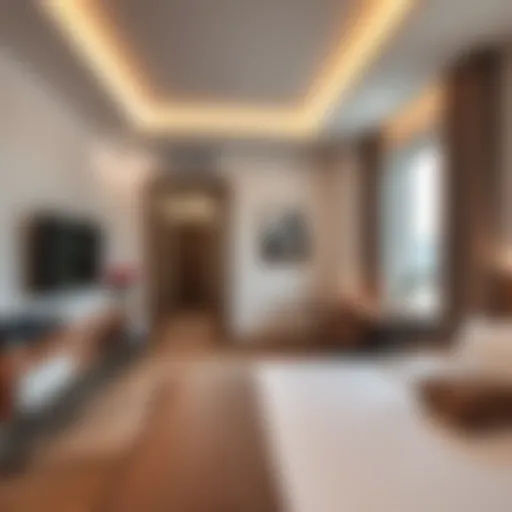IKEA Jebel Ali: Impact on Dubai's Retail and Economy


Intro
In recent years, the retail landscape of Dubai has experienced significant shifts. Among the notable players in this evolving market is IKEA, which has made a substantial mark at its Jebel Ali location. As this article unfolds, we will explore how IKEA has been more than just a furniture store for the local community, shaping consumer preferences and contributing to the broader economy of Dubai.
Market Trends
IKEA's presence in Jebel Ali has coincided with changes in the real estate market dynamics in Dubai. This section delves into both current conditions and future prospects in the realm of property investment and consumer habits.
Current Real Estate Market Conditions
Currently, Dubai's real estate market shows a tentative yet positive recovery following a period of stagnation. Various factors, such as government initiatives promoting foreign investment and infrastructure developments, have energized the property space. Specific neighborhoods have become increasingly enticing for both investors and homebuyers, thanks to their proximity to amenities like IKEA.
With more families moving in search of suburban comfort, areas near Jebel Ali are gaining traction. The influx of new residents is a boon for IKEA, as they seek out affordable home furnishing options to customize their new abodes.
"The presence of major retailers like IKEA often acts as a catalyst for real estate growth, attracting other businesses and redefining the area's character."
Future Projections and Growth Areas
Looking ahead, analysts predict further growth in the Jebel Ali area and surrounding neighborhoods due to anticipated infrastructural upgrades and population influx. New developments are sprouting, and with the upcoming Expo 2020 driving tourism and global attention, the demand for housing will likely escalate.
Some emerging growth areas where investors might consider placing their bets include regions closer to Dubai Marina and Al Maktoum International Airport. These locales offer a balance of accessibility and lifestyle amenities that appeal to potential homebuyers.
Investment Insights
For those interested in navigating the Dubai real estate market, understanding where to invest can be crucial for maximizing returns.
Best Areas for Real Estate Investment
- Dubai Marina - A sought-after area known for its vibrant lifestyle, retail spaces, and proximity to the beach.
- Downtown Dubai - The heart of the city, home to iconic landmarks like the Burj Khalifa and Dubai Mall.
- Jebel Ali - Its strategic positioning near the port enhances its attractiveness for future residential and commercial growth.
- Dubai Silicon Oasis - A technology hub that is fostering innovation and attracting professional residents.
Opting for properties in these areas may yield promising rental returns given the ongoing demand.
Tips for First-Time Investors
- Research Thoroughly: Understand the market trends and economic factors affecting your chosen area.
- Leverage Local Insights: Engage with property experts or local agents who can offer nuanced understanding.
- Budget Wisely: Factor in additional costs like maintenance fees and community charges when assessing potential investments.
- Be Patient: Real estate growth can take time, especially in a fluctuating economy like Dubai's.
Prelims to IKEA Jebel Ali
The significance of IKEA's presence in Jebel Ali is not just about retail; it embodies a cultural shift in shopping habits and economic dynamics in Dubai. Understanding this store provides a lens into how one of the world’s largest furniture retailers influences local consumer behavior as well as the broader market landscape. As more families and expatriates flock to the region, knowing what IKEA Jebel Ali offers helps in deciphering local tastes and preferences, paving the way for informed shopping decisions.
Historical Context of IKEA
IKEA began in Sweden in 1943 as a mail-order company, gradually evolving into a global phenomenon. Its roots lie in a vision to provide well-designed and functional furniture at prices so low that as many people as possible can afford them. Over the decades, it has transformed the home furnishing industry by prioritizing efficient production and innovative design.
The arrival of IKEA in Dubai not only marked a milestone for the brand itself but also signified a broader recognition of the Middle Eastern market. Established in 1991 with stores across the Arab world, IKEA played a pivotal role in shaping consumer expectations and preferences towards modern living spaces. With its motto "to create a better everyday life for the many people," IKEA seamlessly weaves practicality with aesthetics, making a lasting impact on the making of homes in an ever-evolving environment.
Overview of the Jebel Ali Location
Jebel Ali is more than just a name; it’s a hub of commercial activity and development. Located on the outskirts of Dubai, it is a region that embodies the emirate's rapid growth and evolution. This area is known for its strategic importance, housing the largest port in the Middle East and causing an economic buzz.
IKEA Jebel Ali takes advantage of this bustling locale by being easily accessible to both residents and expatriates. This flagship store stands out as a landmark in the area’s shopping landscape, catering to a diverse customer base that reflects the unique tapestry of Jebel Ali’s community. The store's convenient location and extensive product range make it not just a shopping destination, but a cornerstone of everyday life, contributing to infrastructural growth and local culture.
In summary, understanding IKEA's presence in Jebel Ali encapsulates more than mere home furnishing choices; it opens a window into the region’s ambition, lifestyle trends, and the consumer's evolving needs in the modern world.
Store Layout and Design Philosophy
The design philosophy of IKEA Jebel Ali stands out as a critical component in shaping not just the shopping experience but also the overall strategy of the brand. An effective store layout does more than just display products; it influences consumer behavior, encourages interaction with the products, and positions IKEA as a leader in the highly competitive retail landscape. By paying attention to key elements like traffic flow, product accessibility, and aesthetic presentation, IKEA cultivates an engaging shopping environment that resonates with visitors and enhances customer satisfaction.
Open-Concept Showroom
The open-concept showroom at IKEA Jebel Ali serves as the backbone of its design strategy. Unlike traditional stores that often confine products within narrow aisles, the open layout invites customers to wander freely, creating a relaxed and informal atmosphere. Shoppers can seamlessly navigate through various sections, encountering different styles and solutions for every room in their home.
This design strategy promotes exploration, allowing consumers to visualize products in a realistic setting. When items are displayed in fully furnished room vignettes, customers can better understand how they might integrate such products into their personal spaces. The layout not only fosters creativity but also encourages shoppers to linger longer in the store, increasing the potential for purchases.
Moreover, the open design aligns with IKEA’s philosophy of accessibility. Products are easily reachable, reducing the frustration often encountered in more cramped environments. A sense of transparency is established, making it straightforward for customers to compare items. All of this works together to create a cohesive experience that reflects IKEA’s commitment to improving the quality of home life.


Efficient Use of Space
Efficient use of space is another pillar in the store layout and design philosophy of IKEA Jebel Ali. In a bustling city like Dubai, maximizing every square foot is not just practical but essential. The layout is meticulously crafted to ensure that every corner serves a purpose, from the main showroom area to the smaller nooks dedicated to specific product lines.
Incorporating multi-functional displays, IKEA showcases how seemingly small or limited spaces can be transformed into practical living areas. For instance, modular furniture pieces emphasize adaptability, demonstrating how one can make the most of compact living spaces. The clever arrangement of products alongside clever signage guides customers effortlessly through their journey, making it easier to find products while minimizing clutter.
Furthermore, space efficiency is complemented by the strategic placement of rest areas. These zones offer brief respites during shopping, encouraging tired customers to recharge while contemplating their purchases—an aspect that reinforces the customer-centric approach IKEA champions. This balance between aesthetics, functionality, and space utilization underscores the innovative spirit driving IKEA Jebel Ali's store design.
"A well-laid out store speaks volumes about its brand ethos, guiding consumers not just through a shopping process, but through an inspiring experience towards creating their dream homes."
Through its layout and design philosophy, IKEA Jebel Ali succeeds in creating a unique retail space that not only organizes products efficiently but also resonates on a deeper emotional level with its customers. In a marketplace rapidly evolving towards experiences rather than mere transactions, these considerations are paramount in securing IKEA's position as a go-to destination for home furnishings.
Product Range and Offerings
When it comes to retail giants, IKEA stands out with its unique offerings that speak directly to the needs of diverse consumer bases. In Jebel Ali, this is no different. The store attracts a wide range of customers, from families furnishing their first home to young professionals looking for cost-effective solutions. The product range signifies not just the variety but also reflects how IKEA aims to capture the essence of modern living.
Furniture Collections
The furniture offerings at IKEA Jebel Ali represent a broad spectrum, catering to different tastes, lifestyles, and budgets. Customers can find everything from chic Scandinavian designs to multifunctional furniture that suits smaller living spaces. Innovative designs like modular sofas or extendable dining tables come into play for those living in urban areas where space is a premium.
Moreover, many collections come equipped with the aspect of flat-pack convenience, making it easier for consumers to transport items home without hassle. One notable collection, the EKTORP, features a classic, cozy style that resonates well with families, giving them an inviting atmosphere. Furthermore, IKEA offers customizable solutions where customers can mix and match different materials and styles, thus ensuring every home is a reflection of the owner's personality.
Home Accessories and écor
When it comes to accessorizing a home, IKEA is a treasure trove. With a wide array of items ranging from bedding, curtains, to wall art, the store allows individuals to spice up their living space. Functionality and aesthetics drive the design of these accessories. For instance, the FÄRLÖV series not only adds a touch of elegance to a room but also provides the practical comfort needed for daily living.
Additionally, seasonal décor items are available, encouraging shoppers to refresh their spaces throughout the year. Shoppers can also find eco-friendly options like textiles made from organic cotton and recycled materials, ensuring that style doesn’t come at the cost of the planet. The placement of accessories in-store is also thoughtfully curated. Each accessory is displayed in a room setting, giving customers a tangible idea of how they can style their home, making the shopping experience more engaging.
Sustainable Product Lines
With growing concerns about environmental impact, IKEA is proactively integrating sustainability into its product lines. At Jebel Ali, the sustainable offering consists of products made from renewable resources or recycled materials. The IKEA PS collection is a prime example, featuring furniture items designed for longevity and minimal environmental impact.
Moreover, all product lines are developed with a commitment to sustainability, including reducing waste and emissions during manufacturing processes. Each year, IKEA also highlights new sustainable items aimed at environmentally conscious consumers. By offering transparent information about materials used, IKEA builds trust with customers who prioritize eco-friendliness in their purchasing decisions. This approach not only strengthens their brand loyalty but also aligns with the growing trend of consumers wanting to invest in products that reflect their values.
Understanding the diverse product range at IKEA Jebel Ali is imperative for investors and property managers interested in the intricacies of consumer behavior, particularly in Dubai's dynamic market. The ways in which furniture, accessories, and sustainable products are tailored for local preferences reveal essential insights into the retail landscape.
"Every piece tells a story, making a house feel like a home."
Customer Experience and Services
In today's retail landscape, where choices abound, the customer experience stands as a key differentiator for businesses. IKEA Jebel Ali understands this well, placing substantial emphasis on creating a satisfying and seamless journey for its shoppers. This section delves into the various facets of both in-store and online experiences, illustrating how these elements not only attract customers but also build loyalty and trust, which are paramount for any thriving retail establishment.
In-Store Experience and Navigation
Walking into IKEA Jebel Ali is akin to stepping into a world of home design possibilities. The layout of the store, designed with the customer journey in mind, facilitates a natural flow through the various sections. From the moment a shopper enters, they are greeted by an expansive showroom, showcasing the latest in furniture and décor options.
The clever use of design vignettes allows individuals to envision how different items will fit into their own spaces, making it easy to engage with the products. Furthermore, enthusiastic staff members circulate the showroom, always on hand to provide insights or assistance. This approach not only enriches the customer experience but promotes an atmosphere where shoppers feel valued and informed.
In terms of navigation, the store incorporates intuitive wayfinding tools. Brightly colored arrows and informative signage guide visitors through different segments of the store, reducing confusion and enhancing the shopping experience. Many customers appreciate the opportunity to try out the furniture in realistic settings, giving them a stronger sense of comfort before they make a purchase.
Online Shopping and Delivery Options
With the world rapidly shifting towards digital solutions, IKEA Jebel Ali embraces technology to offer a robust online shopping platform. Customers can explore the full product range from the comfort of their homes. The website is clean and user-friendly. Its easy navigation allows shoppers to filter through categories, helping them find exactly what they’re looking for without the hassle.
An essential aspect of their online presence is providing detailed product information along with high-quality images, ensuring customers have all the necessary details at their fingertips. This transparency in information helps consumers feel confident in their decisions. In response to the current consumer trend, options for virtual consultation are also available, bridging the gap between digital and physical experiences.
Moreover, delivery options cater to a variety of needs. Customers can choose between standard delivery and express services, accommodating those who may need their items promptly. The commitment to timely delivery enhances the overall experience and keeps customers coming back.
Customer Service Excellence
Customer service is the backbone of any retail brand, and IKEA Jebel Ali takes this aspect very seriously. The staff is trained to provide exceptional care, ensuring that every customer leaves the store with a positive experience. From the initial greeting at the entrance to assistance with transactions, every touchpoint reflects a commitment to excellence.
Feedback mechanisms, including quick surveys, allow IKEA to gauge customer satisfaction and address concerns promptly. This responsiveness demonstrates a keen understanding of the importance of consumer feedback. Staff members are also equipped with extensive product knowledge, enabling them to answer questions and offer guidance effectively.
Additionally, the returns policy is straightforward, exemplifying IKEA's confidence in its products. Knowing that there is a safety net allows customers to shop with peace of mind. When shoppers feel well cared for, they are more likely to become repeat customers, reinforcing IKEA’s brand loyalty in the competitive market of Jebel Ali.
"A satisfied customer is the best business strategy of all." This statement encapsulates the essence of IKEA Jebel Ali’s point of view when it comes to customer experience. By weaving together an inviting in-store atmosphere, a robust online presence, and exemplary customer service, IKEA positions itself as not just a store but a beloved part of the community.


Logistical Considerations
The role of logistical considerations at IKEA Jebel Ali is more than just moving boxes from point A to B. When you look deeper, you see a vast web of operations that echoes throughout the region, shaping how people engage with retail and making shopping more convenient and efficient. From supply chain management to warehousing solutions, these factors are critical in ensuring that IKEA not only meets customer demand but also sustains its operational edge in a competitive marketplace.
Supply Chain Management in Dubai
IKEA's supply chain management in Dubai is a well-oiled machine, reflecting a commitment to efficiency and effectiveness. The bustling nature of Dubai as a global trade hub underscores the need for a robust supply chain. By leveraging local suppliers and maintaining relationships with international partners, IKEA has taken strides to optimize its flow of products.
- Local Sourcing: One of the secrets to IKEA's success is its ability to source materials locally, which reduces transportation costs and lead times. By establishing partnerships with local manufacturers, IKEA minimizes the impact of global supply chain disruptions.
- Technology Integration: The use of state-of-the-art technology in logistics cannot be understated. Automation in warehousing and distribution systems allows for real-time tracking of inventory, helping to adjust operations swiftly in response to demand fluctuations.
- Sustainable Practices: In recent years, IKEA has emphasized sustainability in its supply chain. This means not only sourcing materials that are more eco-friendly but also optimizing transportation methods to reduce the carbon footprint.
Implementing these strategies has helped IKEA maintain its reputation for reliability in delivery while carving out a competitive advantage in the marketplace.
Warehousing Solutions
Logistics do not stop at supply chain management; warehousing solutions play a pivotal role in how IKEA Jebel Ali operates. The strategic placement and design of warehouses in Dubai contribute to a seamless operational flow.
- Strategic Locations: Warehouses are located near major transportation routes and ports, facilitating fast and efficient distribution to retail locations. This proximity significantly cuts down on delivery times, ensuring customers can get their purchases in a timely manner.
- Inventory Management: Sophisticated inventory management systems allow IKEA to keep track of stock levels in real time. This means products are always available when customers need them, avoiding stockouts that can lead to lost sales.
- Adaptive Design: The design of these warehouses is adaptive; they are equipped to handle a variety of product categories. Flat-pack furniture, for instance, requires different storage strategies compared to larger, more bulk items. This versatility ensures efficiency across all offerings.
"Efficient warehousing is like the backbone of our operations. Without it, we would struggle to meet our customers' ever-growing demand for convenience and speed."
In summary, the logistical considerations at IKEA Jebel Ali are multifaceted, intertwining supply chain management with innovative warehousing solutions to create a resilient operational backbone. Understanding these elements provides key insights into how IKEA sustains its presence and efficiency in the fast-paced retail environment of Dubai.
Sustainability Initiatives
Sustainability has become a cornerstone of modern retail, and IKEA Jebel Ali has embraced this ethos wholeheartedly. The emphasis on sustainability initiatives reflects not just a corporate responsibility but also a recognition of the positive impact on both local communities and the environment. For investors, home buyers, and property managers, understanding these efforts offers insights into IKEA's long-term viability and commitment to ethical practices. This exploration of sustainability initiatives will dig into two key areas: environmental stewardship practices and community engagement efforts. Together, they illustrate IKEA's holistic approach to sustainability.
Environmental Stewardship Practices
IKEA has long touted its commitment to minimizing its ecological footprint. At Jebel Ali, this commitment manifests through various measures aimed at both resource conservation and waste reduction. For instance, elements such as renewable energy use in operations and sustainable sourcing of materials set a solid foundation. The store incorporates energy-efficient lighting systems, utilizing LED bulbs that use less electricity, which not only helps the environment but also lowers operational costs.
Furthermore, IKEA performs regular audits to ensure that the materials used in their products meet environmental standards. This practice extends to ensuring that timber is sourced from responsibly managed forests, which aligns with global sustainability goals. The message is clear: choosing IKEA means selecting products designed to minimize environmental impact, a fact not lost on eco-conscious consumers.
"Incorporating sustainability into our business model not only helps the planet but also resonates with the modern customer's values."
Additionally, the brand’s commitment to significantly reducing greenhouse gas emissions by a targeted percentage speaks to their forward-thinking agenda. Customers often appreciate being part of a solution, and IKEA's transparency around its eco-impact fuels engagement.
Community Engagement and Social Responsibility
Beyond environmental commitments, IKEA Jebel Ali is devoted to making a lasting difference in the local community. This is achieved through various community engagement and social responsibility efforts tailored to foster a sense of belonging and connection.
One notable initiative is collaboration with local charities, which allows for a unique channel of reaching underprivileged sectors while encouraging employees to volunteer their time and skills. The community events are not just feel-good stunts; rather, they transform into platforms for dialogue between the business and local residents, paving the way for more inclusive strategies moving forward.
IKEA also prioritizes education, frequently organizing workshops to improve local craftsmanship. This engagement benefits both the community and IKEA by fostering local talent, which may eventually lead to partnerships that enhance product offerings.
In summary, the sustainability initiatives at IKEA Jebel Ali encapsulate a comprehensive approach that balances environmental practices with a robust commitment to community welfare. These initiatives underscore the brand's role not only as a retailer but also as an active participant in social and environmental stewardship. For investors and property managers, these strategies could signal a business model rooted in the future's values, making IKEA Jebel Ali a significant player in Dubai's evolving marketplace.
For further reading on sustainability practices, see:
Economic Impact on Jebel Ali and Dubai
The presence of IKEA in Jebel Ali is not just a matter of selling furniture; it reflects a significant contribution to the local economy and job market. Understanding the economic impact of this retail giant in Dubai, particularly in Jebel Ali, allows us to grasp the interconnections between global brands and local markets. IKEA serves as a microcosm for studying these dynamics—an embodiment of how retail can stimulate growth, create opportunities, and reflect broader economic trends.
Employment Opportunities Created
One of the most immediate benefits of IKEA's establishment in Jebel Ali is the creation of job opportunities. When a store like IKEA opens its doors, it doesn't just hire a handful of employees; it creates a ripple effect across the job market. The IKEA store employs a diverse range of staff—managers, sales personnel, logistics experts, and customer service agents. Additionally, it provides opportunities for part-time positions, catering to students or those wanting flexible work hours.
"In 2022, IKEA Jebel Ali provided over 1,200 jobs, making a substantial mark in local employment patterns."
This influx of employment has several benefits:
- Reduced Unemployment: With the hiring of locals, the overall unemployment rate diminishes, which in turn fosters economic stability.
- Skill Development: Employees benefit from training programs that enhance their skills, which can eventually be beneficial for their careers beyond IKEA.
- Enhanced Local Economy: More jobs mean more income. This income is typically spent within the local community, supporting other businesses and creating a thriving local economy.
Contributions to Local Economy


The impact of IKEA in Jebel Ali extends far beyond employment. The store acts as a hub for economic activity, channeling money into various sectors of the local economy.
- Secondary Transactions: The traffic generated by IKEA not only benefits its sales figures but also boosts local businesses. Cafés, gas stations, and retail shops around Jebel Ali experience increased patronage as customers stop by after visiting the store.
- Tax Revenue: The store contributes significantly to local government through taxes. These funds are crucial for community services, infrastructure, and other public needs.
- Supplier Opportunities: IKEA often sources materials and goods locally. By partnering with local manufacturers and suppliers, the brand strengthens the local supply chain, which enhances the overall economy of Dubai.
- Cultural Exchange: The diversity of customers that IKEA attracts fosters a blend of cultures, which can lead to innovations in product offerings and service styles, catering to various demographics within the UAE.
In summary, the economic impact of IKEA on Jebel Ali and by extension Dubai, is multi-faceted. From job creation to stimulating local businesses, the brand plays a pivotal role in shaping the economic landscape. This extends beyond mere numbers and statistics—it weaves into the very fabric of Dubai's community, enhancing not only the consumer experience but the overall quality of life.
With the retail giants like IKEA taking root in Jebel Ali, the potential for further growth and expansion paints a promising picture for the future of the region. Investors and stakeholders should pay attention to these dynamics, as they can yield insights into future trends and economic shifts.
Comparative Analysis with Other Retailers
In the vast arena of retail, understanding the competitive landscape is crucial, especially for investors, home buyers, and property managers keeping an eye on market trends. This comparative analysis of IKEA’s Jebel Ali branch versus other retailers provides insights into its strategic positioning and the unique advantages it offers in Dubai’s dynamic retail environment. By examining IKEA's market presence alongside its competitors, we can glean essential data that shapes investment opportunities and consumer choices in the region.
Market Positioning of IKEA
IKEA's approach to market positioning in Jebel Ali distinguishes it from other retailers. Unlike high-end furniture brands that often focus on luxury buyers, IKEA emphasizes affordability and accessibility. The flat-pack concept enables customers to transport items easily, appealing to a broad demographic, including young professionals and expats.
Additionally, IKEA’s brand messaging resonates with consumers seeking both function and style. The focus on Scandinavian design—clean lines and minimalist aesthetics—has found a diverse audience in Dubai, where the demand for modern, efficient home solutions is rising.
Some key points around IKEA’s market positioning include:
- Value Proposition: Quality furniture at reasonable prices.
- Customer Reach: Targeting various consumer segments through effective marketing strategies.
- Brand Image: A friendly and approachable brand compared to more traditional luxury furniture stores.
Strengths and Weaknesses
A deeper inspection reveals both strengths and weaknesses that shape IKEA’s standing within the market landscape in Jebel Ali.
Strengths:
- Diverse Product Range: IKEA offers a broad assortment of items beyond just furniture, including kitchenware, textiles, and home decor. This all-in-one shopping experience draws consumers in, making IKEA a convenient destination.
- Strong Online Presence: With an efficient online shopping platform, IKEA caters to the growing preference for digital shopping. Options for home delivery enhance customer satisfaction, setting it apart from local retailers with less robust online offerings.
- Sustainability Efforts: IKEA has gained traction with eco-conscious consumers through its commitment to sustainability, including sourcing materials responsibly and reducing waste in production. This positions IKEA favorably against competitors who may lack strong environmental policies.
Weaknesses:
- Product Assembly: While the DIY model appeals to some, others find the assembly process daunting, which could deter potential buyers seeking ready-to-use solutions.
- Limited Customization: Unlike some retailers offering bespoke furniture solutions, IKEA’s focus on standard designs can turn off customers looking for personalized options.
- Price Sensitivity: Although IKEA markets itself as affordable, fluctuations in material costs could force price adjustments, risking loss of price-sensitive customers.
"In a rapidly changing retail landscape, understanding competitive positioning is not just insightful; it is vital for strategic planning.��”
By reflecting on these strengths and weaknesses in a comparative context, stakeholders can see both the opportunities that IKEA Jebel Ali presents and the challenges it may face in maintaining a competitive edge against other retailers in Dubai’s ever-evolving market.
Future Prospects for IKEA Jebel Ali
Understanding the future prospects for IKEA Jebel Ali is crucial for stakeholders, from investors to local homeowners and property managers. This section will delve into the strategic plans that IKEA has in store while also assessing how these plans could potentially reshape the retail landscape in Dubai. The importance of this section lies not only in the immediate benefits that these expansions bring, but also in the long-term considerations, influencing the wider socio-economic environment. IKEA's commitment to innovation and customer-centric designs is critical in paving the way for its continued relevance in a rapidly changing market.
Expansion Plans in the Region
IKEA’s ambitious expansion plans within the UAE signal its ongoing confidence in the regional market. The brand has maintained a steadfast stance on increasing its footprint, particularly in areas that demonstrate growth in consumer demand. This entails not just new store openings, but also the enhancement of existing locations. By integrating localized designs and products which cater to the sensibilities of the Arabic customers, IKEA aims to resonate more deeply with its target market.
- The upcoming store in Abu Dhabi is a prime example of IKEA’s forward-thinking approach. This location will feature an expanded product range tailored to the preferences of local consumers while maintaining the hallmark affordability. It's a step to not only increase sales but also to cultivate brand loyalty among a diverse customer base.
- Moreover, there are preliminary discussions regarding the feasibility of establishing smaller, urban-format stores in densely populated areas. This allows IKEA to reach customers more directly and provide a more engaging shopping experience, thereby tapping into the convenience factor which is highly valued in today’s fast-paced life.
Adapting to Changing Consumer Trends
In the evolving retail landscape, adaptability is key. Consumers today are more discerning, seeking not only quality products but also brands that echo their values. IKEA is already well aware of this shift and actively adapts its strategy to meet the changing expectations.
- The move towards sustainability is increasingly influential. Many consumers are prioritizing eco-friendly options and preferring brands that align with their values. IKEA is adapting its product offerings by increasing the share of sustainable materials as part of its inventory.
- Technological integration is another area where IKEA is adjusting. With the rise of e-commerce, their online shopping platform has undergone enhancements, making it easier for customers to navigate products and make purchases. This can significantly expand their market reach while catering to the preferences of tech-savvy consumers.
- Additionally, community engagement initiatives signify a shift in brand perception. Understanding local customs and preferences plays a significant role, and IKEA’s strategy underlines the importance of being more than just a retailer; it works to forge connections within the communities.
End and Key Takeaways
In closing, an exploration of IKEA Jebel Ali culminates in understanding its multifaceted role in the local retail circuit and broader economic landscape. As this article illustrated, the impact of IKEA extends beyond mere furniture sales; it has intricately woven itself into the fabric of both consumer lifestyles and the real estate dynamics in Dubai.
Summary of Insights
A few essential takeaways can be gleaned from the discussions within this article:
- Market Influence: IKEA has clearly established itself as a leading player in the Jebel Ali market, influencing not just consumer preferences but also setting benchmarks for retail operations in the region.
- Economic Contributions: The store has generated substantial employment opportunities, playing a pivotal role in not just jobs but also nurturing careers through various development programs.
- Sustainability Efforts: IKEA’s commitment to sustainability initiatives marks it as a conscientious corporate entity, acknowledging its environmental responsibilities while fostering community engagement.
- Consumer Experience: The balance between an enjoyable in-store experience and effective online shopping options reflects IKEA's understanding of contemporary shopping trends.
Final Thoughts on IKEA's Role in Jebel Ali
Reflecting on IKEA's role in Jebel Ali, one could argue that it transcends that of a conventional retailer. Instead, it stands as a beacon of modernity in Dubai’s retail sector. By tailoring its offerings to cater to the unique demands of the local population while remaining globally relevant, it shapes consumer buying behavior in significant ways. Moreover, its strategic location in Jebel Ali enhances logistical advantages, allowing for efficient stock management and timely customer service.
In summary, IKEA is not merely a store; it is a vital contributor to both local culture and the economic vitality of the region, continually adapting to changes in consumer trends and market demands. As it moves forward, it will be intriguing to see how IKEA further solidifies its position while maintaining its core values of affordability and quality.
“In an evolving market, staying adaptable is not a luxury; it's a necessity.”
For further reading on IKEA's sustainability efforts, visit their dedicated page on IKEA Sustainability. Additionally, insights into Dubai’s economy can be explored through Dubai Economic Department.















